Dealing with Emotional Overwhelm as an ENFP
2020 has been a year of emotional turmoil, heightened stress, sickness, frustration, and inequality. Many of us are feeling emotionally drained and burned out. It seems like the hits just keep coming and you’ve barely recovered from the last one before another one shows up out of the blue. The emotional overwhelm affecting everyone can show up in different ways for different personality types. Today I want to take a look at the ENFP with you. How do these types show up differently when they’re emotionally drained? How may they seem unrecognizable or atypical?
I know, I know. I’m not an ENFP. But I had a lot of help from ENFPs when I wrote this article. I got some excellent suggestions from ENFPs and also found some great advice from books like “Was That Really Me? How Stress Brings Out Our Hidden Personality” and “Understanding Yourself and Others – An Introduction to the Interaction Styles”
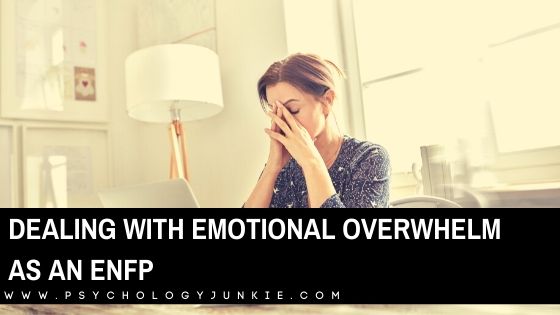
Not sure what your personality type is? Take our new personality questionnaire here. Or you can take the official MBTI® here.
This article contains affiliate links. If you purchase an eBook from one of my links I get a small percentage back to help run my site.
So let’s talk about ENFPs…
How ENFPs Deal With Emotional Overwhelm
ENFPs are often called the “enthusiasts” or the “champions.” These types win over crowds with their imagination, enthusiasm, and creativity. They are idea-generators, innovators, and often gifted counselors all in one. However, when they’re emotionally burned out they can seem more reserved, distant, and confusing. Some friends might feel confused or shocked by this sudden change. Where is their optimistic, possibility-seeing friend? It may seem like an imposter has possessed their body.
Responding to your ENFP friend in an understanding, validating way is essential during these times. Pointing out their emotional change and pressuring them to get back to normal will only make things worse. Let’s dive into this a little more:
Signs of an Emotionally Overwhelmed ENFP:
#1 – They are more quiet than usual
ENFPs that are emotionally overwhelmed retreat into their thoughts and seem far less gregarious than normal. They need to shut the door on the noise and pressure of the outside world and process their feelings and thoughts in-depth.
#2 – They become more rigid
Tunnel vision is the curse of the emotionally overwhelmed ENFP. They’ve usually exhausted their intuition to such an extreme degree that they get stuck in the grip of their inferior function; Introverted Sensation (Si). They become fixated on the best-proven way to accomplish something and will try to gather facts and details to prove that this one direction is the ONLY possible one.
#3 – They become picky about details
Details that never bothered an ENFP before might suddenly seem glaring and overwhelming. While on an ordinary day they’d never notice the state of their desk, when they’re emotionally overwhelmed they might frenetically clean every nook and cranny. Woe to the speck of dust that would stand in their way!
#4 – They feel exhausted and/or nauseous
ENFPs have a habit of pushing themselves too hard, often at the expense of their physical well-being. When they are trying to solve a problem or think of an idea their focus is fixated on theories, possibilities, alternatives, and solutions. They often lose touch with their body’s signals in their search for answers. When the emotional overwhelm sinks in they suddenly feel the pangs of their physical neglect. Suddenly they succumb to the exhaustion, aches, and churning stomach aches that they’ve brought upon themselves due to their lack of self-care.
#5 – They may have a monotone voice
ENFPs who are emotionally overwhelmed feel drained of external passion and energy. Unlike their typical energetic self, ENFPs in this state are so distracted by their own stress and uncertainty that they can’t force any animation into their face or tone of voice. They will often be withdrawn, distracted, and low-energy.
#6 – They are pessimistic
When stressed or emotionally overwhelmed, ENFPs become demoralized and unable to imagine any good possibilities. Because ENFPs are typically so quick to come up with ideas, this state feels alarming to them. They feel like they’ve lost their spark, and they worry that it will never come back again.
#7 – They are unsure of themselves
When emotionally overwhelmed, ENFPs tend to doubt their own perceptions and judgments. They feel uncertain about their thoughts and judgments and overthink their conclusions. They worry about making the wrong decision so they get stuck obsessing over facts and details, trying to discern a pathway out of their anxiety.
#8 – They become unusually focused on physical symptoms
Because ENFPs are so often preoccupied with ideas and their ideals, they tend to ignore their physical needs or sensations. When emotionally overwhelmed, however, ENFPs start to fixate on physical symptoms. A headache might terrify them with fears of brain hemorrhages or cancer. The shortness of their breath and the weakness in their knees might make them worry that they are on the verge of having a heart attack. Fears of serious illness are a major plague to them at this stage.
#9 – They feel misunderstood
Frozen and numb inside, ENFPs in this state often feel hopeless and depressed. People who have grown used to their optimistic energy may pester them with questions and push them to return to their normal demeanor. This only makes things worse. The ENFP will often retaliate with critical, sharp words meant to shut out the noise and pressure. This can result in damaged friendships or unintended offenses, and this only adds to the ENFP’s stress and overwhelm. They often feel misunderstood, pressured, and surrounded by fair-weather friends.
#10 – They may accuse others of irrationality
At times like these, ENFPs often feel disconnected from their feeling side. They turn inward, becoming grumpy, depressed, and focused on facts. They want to just stew things over in their heads and be left alone. Suddenly the logical flaws of other people’s choices seem glaringly obvious. In their frustration, they might point out other people’s errors and lapses in judgment only to be met with derision.
How to Cope:
More than anything, meditation has been unanimously mentioned by ENFPs as a way to cope with emotional overwhelm. These extroverts need a chance to shut the door on the outside world and process their grief, despair, and stress without prying eyes lurking. Essentially, they need people to back off and give them a chance to still the storm in their mind. Physical exercise is also a major pick-me-up as it releases stress-reducing endorphins in the brain. Visualizing a peaceful place in silence can also help.
“I continue to tell myself “This too shall pass” I focus on what I CAN control; my attitude, loving and being with family, exercising and eating right, and asking myself “What steps can I do today to get me closer to my goals?” – Madeline Purvis, an ENFP
“Usually when I’m emotionally overwhelmed it’s a sign that I’ve been ignoring myself for too long. I need to take a nap, drink several glasses of water, practice some yoga. After a few hours (or a few days) of attending to my health my mind calms down and I go back to normal.” – Lucia Dormund, an ENFP
Other tips for coping with emotional overwhelm:
- Get adequate sleep. Most adults need 7-9 hours per night.
- Get a massage (or self-massage!)
- Eat a healthy, delicious meal
- Take a moment to rationally evaluate the situation as it actually is
- Talk to someone who can show empathy without trying to solve the problem or give a lot of advice
- Practice deep breathing
- Practice visualization techniques
- Get counseling or therapy
- Smell some fresh lemon, lavender, rosemary, cinnamon, or peppermint. These scents are known to automatically lift the spirits.
- Journal your thoughts and feelings
What Are Your Thoughts?
Do you have any suggestions or insights for ENFPs? Let us know in the comments! Find out more about your personality type in our eBooks, Discovering You: Unlocking the Power of Personality Type, The INFJ – Understanding the Mystic, and The INFP – Understanding the Dreamer. You can also connect with me via Facebook, Instagram, or Twitter!


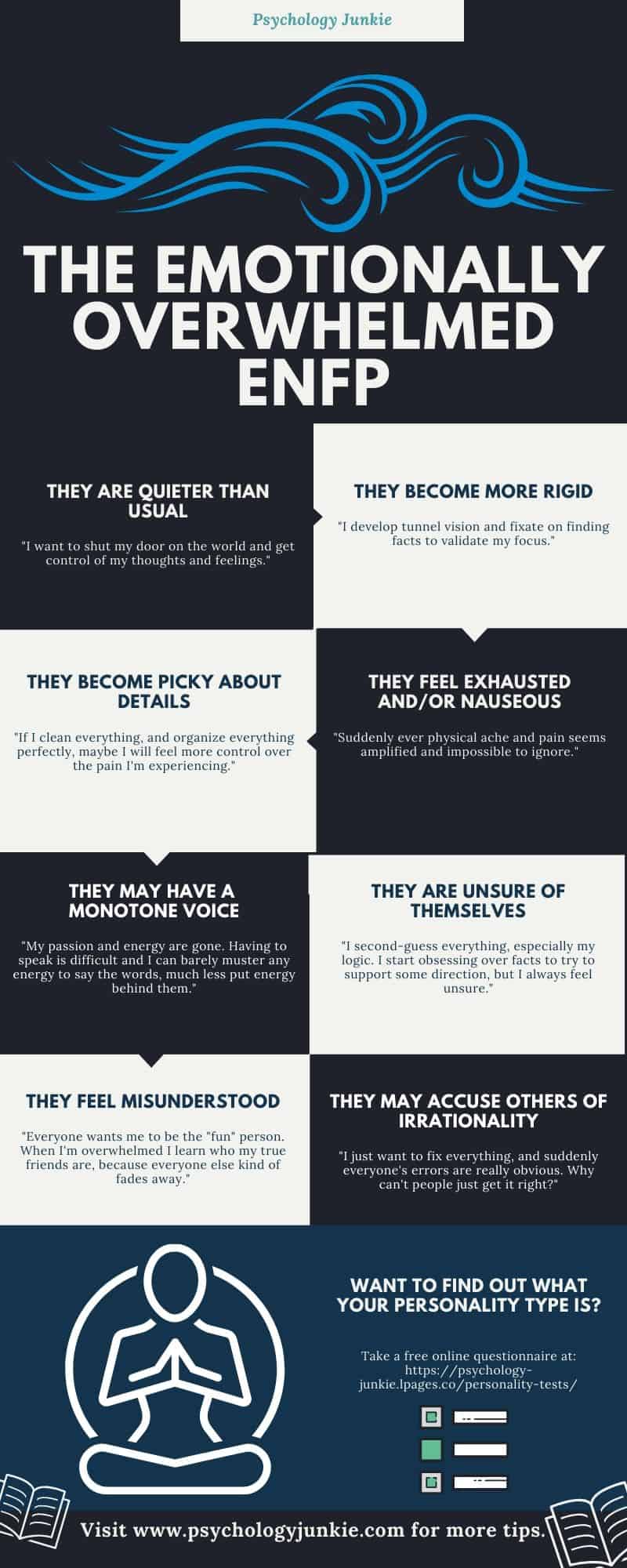



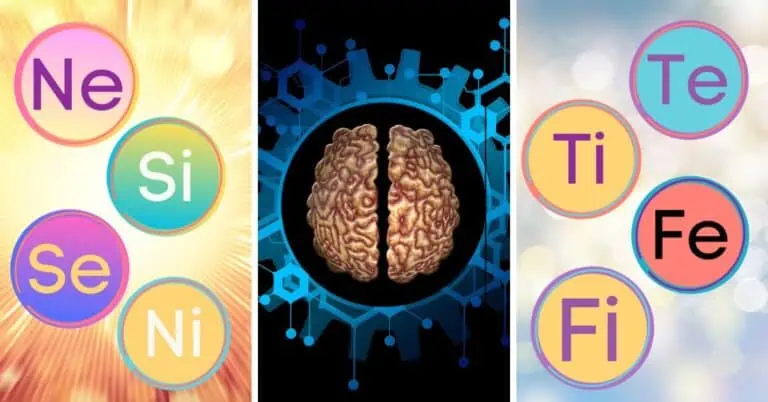
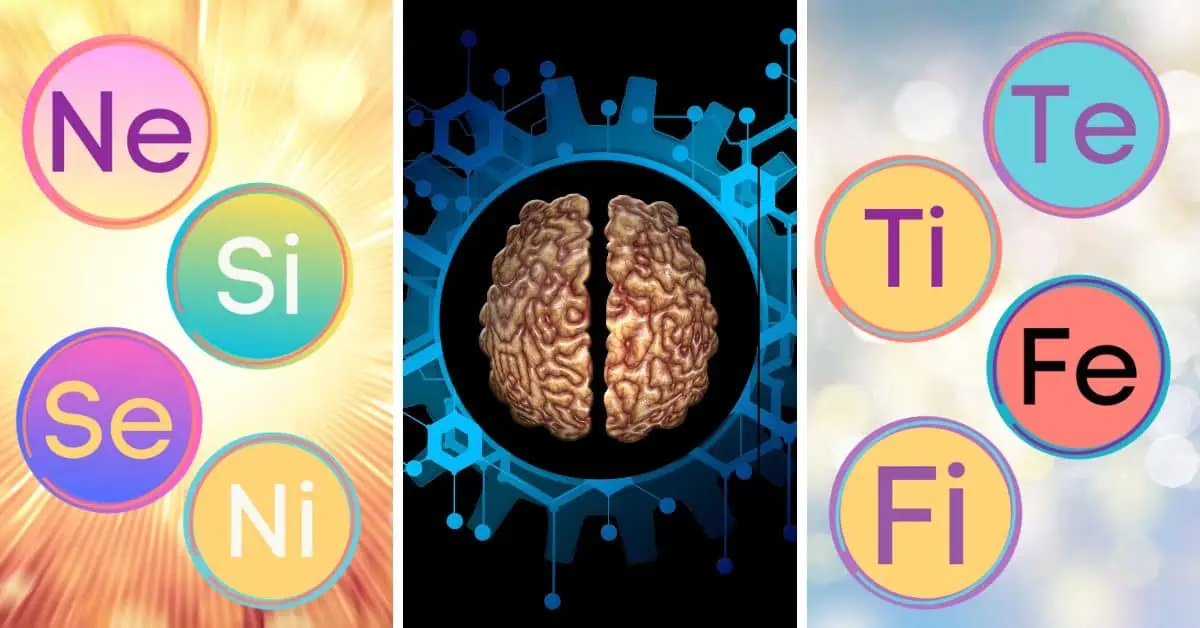


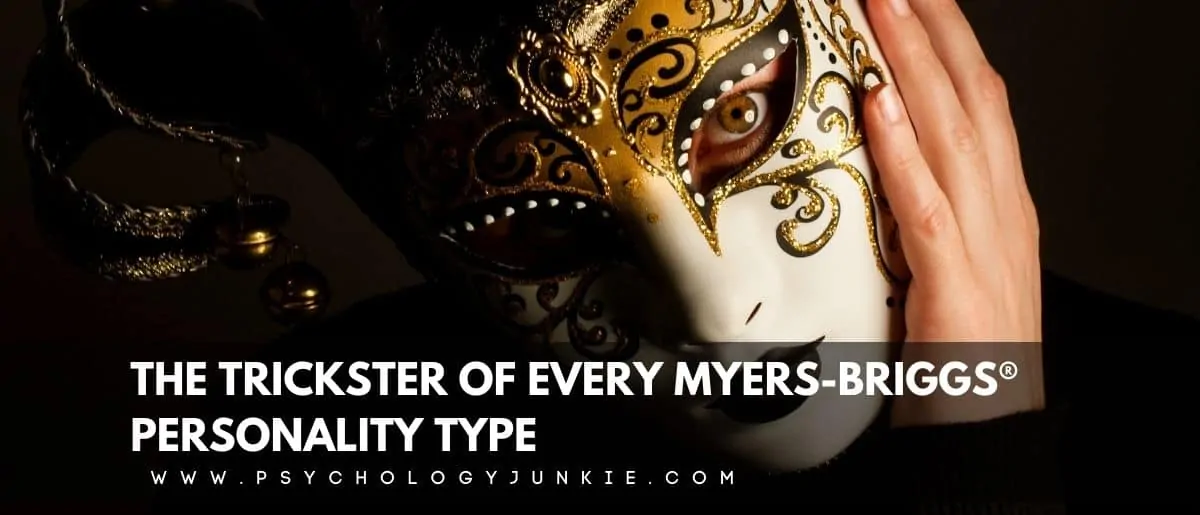
This article was wonderfully helpful in summarizing everything that I have often experienced as an ENFP, as well as being such a great go-to resource to remind myself of what might be going on my mind which I’m unaware of(sometimes all that’s needed is self-awareness, to get back on track!) Thank you for putting it all together so well!
Holy crap I’m an ENFP! I always wonder if I’m an INFP vs ENFP because I’m straight down the middle of E/I but that chart right there was me to a T when I’m stressed out.
Was very surprised to see I’m an ENFP. I am undergoing a lot of stress in my life and this helps me to understand myself a little better and not be so concerned that something bad is happening to me. It also helps me to see that I have many gifts with which I can help my family and others. I realize too that I have much that I can contribute to the world around me. Thank you.
I’m an ENFP and I found this article incredibly helpful when I was struggling with burnout and emotional overwhelm. I’m so grateful not to be in those places anymore. The only tip that I have to add is that it’s not just meditation, but prayer too. I couldn’t imagine wrestling through this without my faith to back me up!